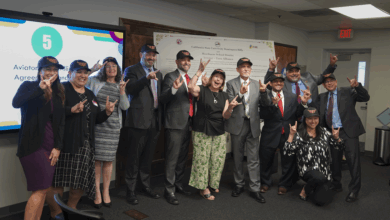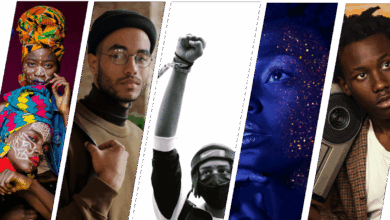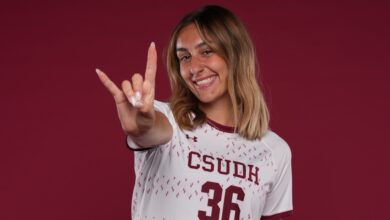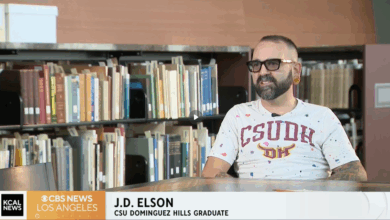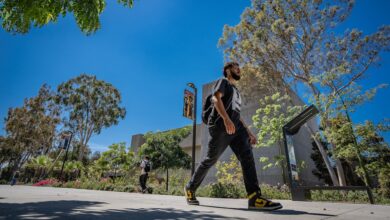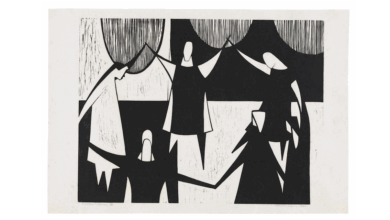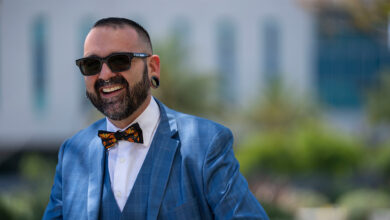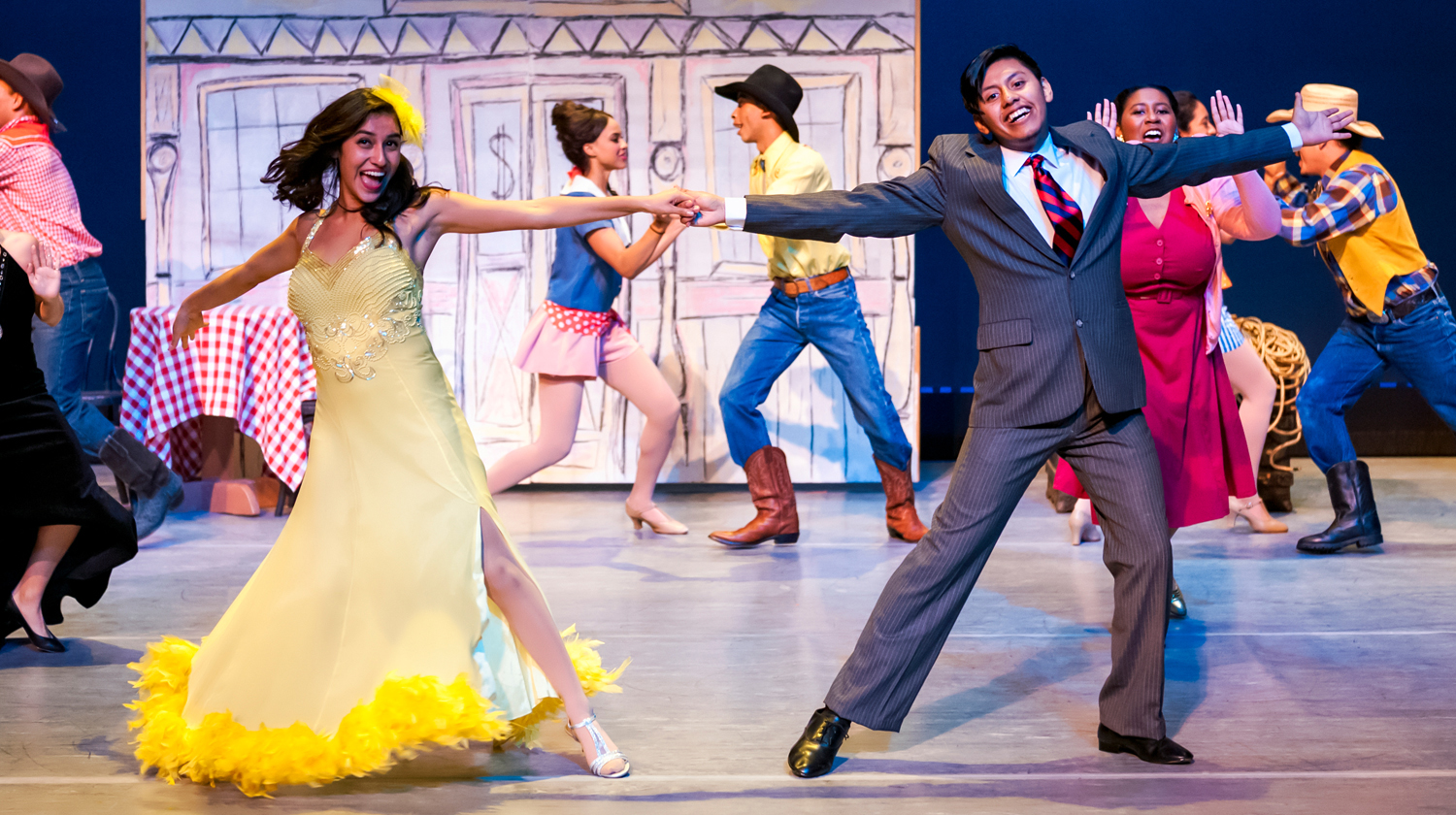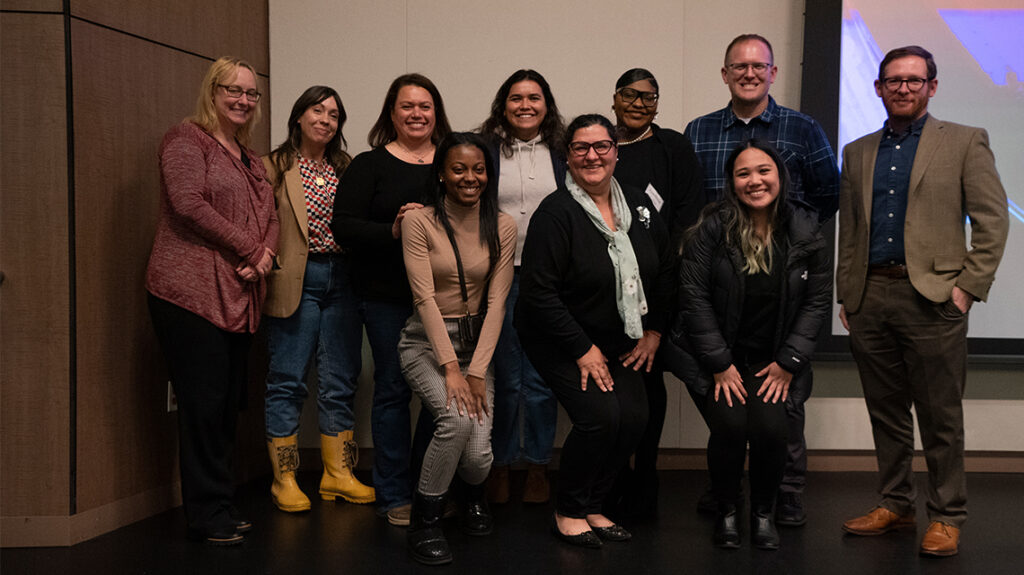
CSUDH convened its 18th annual Student Research Conference (SRC) on Feb. 22-24. The three-day event highlighted the extraordinary depth and quality of scholarly research by 330 undergraduate and graduate students in fields ranging from anthropology and history to chemistry and behavioral and social sciences.
Cheyenne Cummings, an Earth Sciences lecturer and co-chair of the SRC, says the conference demonstrates the importance of research to overall student learning and provides crucial experience for students considering graduate and post-graduate education.
“The SRC gives students the opportunity to learn how to present, which is one of the most amazing aspects of this program. It allows them to get their feet wet, and they get direct feedback from faculty, staff, and judges on what they did well and what needs to be improved,” Cummings says.
He adds that CSUDH students routinely meet a high standard of achievement. “We typically receive several placements in first, second, or third place at statewide competitions because of the quality of the research compared to other schools that might have more advanced technology or access to more grants and funding.”
More than 1,000 people attended this year’s event as COVID-19 restrictions that hampered attendance in previous years were eased. Leeanne Bergeron, a lecturer in English and a judge this year, says she recognized the lingering impact of the pandemic on some of the in-person presentations.
“I noticed that some of them were a little halting, but the depth of understanding really showed during the Q&As. I’m so impressed with just how much our students do know,” Bergeron says. “We’ve had to pivot. These are different students and we’re a different society, but the scholarship has not suffered.”
Aysa-Monae Collins, a senior majoring in health science with a double minor in public administration and women’s studies, provided strong proof of just how significant student scholarship remains. She earned three first-place honors for presentations that focused on fetal and infant mortality rates among non-Hispanic black women.
“Women of color, and especially non-Hispanic black women, are at the highest risk of experiencing poor maternal outcomes, whether it be from maternal mortality, pre-term birth, fetal mortality, or infant mortality,” Collins says.
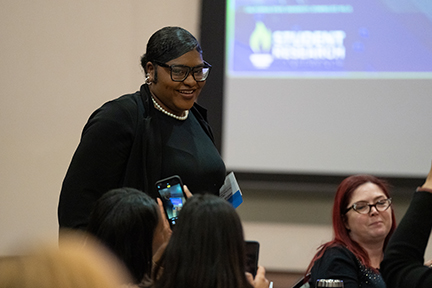
Collins adds that she hopes to combine her interests in public administration, health care, and social justice to make a difference in communities of color. “I want my research to change the narrative and improve the experience that people of color and indigenous people have with the health care system.”
Dr. Helen Oesterheld, an associate professor of English, and a faculty mentor for three student presenters, says that challenging dominant narratives was a common theme for many of the humanities presentations. “It’s very satisfying to see students bringing their voices and their own rethinking of conventional and traditional critical approaches and new interpretations to literary texts.”
Oesterheld adds that the quality of research from the students she mentored showed their infinite potential. “It is really a great honor to be able to work with them and to help them realize their dreams, their goals, and to realize that potential. It is the best feeling in the world.”
In his introductory remarks at the SRC opening reception, CSUDH Provost Michael Spagna identified two important features of the conference. “This conference unlocks everything. It equips students with the ability to present, to do analytics, and to conduct original research. But more important than that, it serves as a bridge for students to ask faculty what research really got them excited as students.”
Spagna added this challenge: “Ask yourself what is it that you’re doing as students–even in this year’s conference–that will lead you on the path to a career that’s going to make a difference in the world.”
Creating positive change informed numerous student research presentations. First-place projects included studies on inequality in higher education, intersectionality among the student veteran community, the impact of climate change on regional flora, and the devastating impact of long COVID on patients and their families.
Armando Garcia, a second-year graduate student in environmental studies, analyzed the ecological footprint created by commuter students, faculty, and staff at CSUDH for his poster presentation. “Commuters to CSUDH emit nearly 16,000 metric tons of carbon dioxide each year,” Garcia said. “We are a very sustainable campus, but there’s a lot more we can do in the area of transportation.”
This year’s SRC also welcomed back one of CSUDH’s own–Dr. Monica Lomeli, who graduated in 2007 as a McNair Scholar before completing her MA and PhD at UC Santa Barbara. She serves as the Human Services Administrator for the LA County Commission on Human Relations, where she manages the county’s hate crimes database.
“My undergraduate experience at CSUDH was truly world-class,” Lomeli said during her keynote address at the SRC’s opening reception. “Who gets to be immersed in research and data collection so early on in their post-secondary education.”
Lomeli said her own ethnographic research ultimately helped her find a broader canvas for her future career. She discovered a natural ability to bring groups divided by race, gender, and socioeconomics together and help them better understand others’ perspectives. She challenged this year’s SCR participants to find their own broader canvas.
“No matter what field or discipline you choose to further your education or jumpstart your career, think about how your research can go beyond the reach of academia to improve the quality of life for marginalized and vulnerable populations.”
Student Research Conference 2023 Winners
Graduate Oral Sessions
Behavioral and Social Sciences
First Place: Denise Y. Aguiluz and Belen V. Guillen, “Effects of Intimate Partner Violence and Discrimination During Pregnancy on Black Women’s Mental Health”
Research Mentor: Irene Tung (Psychology)
Behavioral and Social Sciences, and Business
First Place: Aina Ali, Paula Basto, ”‹Seth Almberg, and Iram Aziz, “A Powerful Form of Resistance”: Mindfulness and Personal Relationships in the LGBTQ+ Population”
Research Mentor: Sheryl Ryan (OT)
Second Place: Gautham Alampalli Amarnath, “First-generation college students and IT career: From the Career Anchor Perspective”
Research Mentor: Nancy Deng (Information Systems)
Education and Humanities
First Place: Diane Dizon, “Exploring Student Veteran Intersectionality and its role in Belonging at 2- and 4-year Institutions”
Research Mentor: Alfredo Gonzalez (Chicana and Chicano Studies)
Health, Nutrition, and Clinical Science I
First Place: Rebekah Boning, Nicole Stephanie Pantaleon, Julie E. Schustack, and Amber Schwartz, “Behind the Mask: Impression Management in Women With ADHD”
Research Mentor: Sheryl Ryan (Occupational Therapy)
Health, Nutrition, and Clinical Science II
First Place: Carly Wong, Erica Ni, Alice Sinclair, and Daphne Wang, “The Long Haul: Stories of Persons with Long COVID and Their Loved Ones”
Research Mentor: Sheryl Ryan (Occupational Therapy)
Health, Nutrition, and Clinical Science III
First Place: Krystal Lopez, Jocelyn Macias, and Ashley Hansack, “Experiences of 1st Generation Latinx Individuals and Their Occupation of Health Management”
Research Mentor: Sheryl Ryan (Occupational Therapy)
Health Science, Business, and Education (Online)
First Place: Cindy Knapp, “Reducing Unplanned Extubation Occurrences in the NICU: An Integrative Review”
Research Mentor: Terri Ares (Nursing)
Physical and Mathematical Sciences
First Place: Elizabeth Hernandez, Michael Wood, Christopher Rojas, and Joanna Campos, “CSUDH’s Zero Waste Efforts and Capabilities”
Research Mentor: Parveen Chhetri (Earth Science)
Physical, Mathematical, and Biological Sciences
First Place: Michelle Mohr, “Changes in recent summer temperatures are influencing the radial growth of Pinus ponderosa in Prescott National Forest, Arizona”
Research Mentor: Parveen Chhetri (Earth Science)
Graduate Poster Sessions
Behavioral and Social Sciences, and Education
First Place: Jennifer Baker, “Supporting Positive Mother-Infant Interactions among Adolescent and Young Adult Mothers”
Research Mentor: Irene Tung (Psychology)
Second Place: Lauren Jensen, Zoe Allyson, ”‹ Will Kellett, and Sara Merlock, “Perception of Mobility Assistive Devices”
Research Mentors: Julie Werner (Occupational Therapy), and Jennifer LuÄarević, and Mojtaba Kamyab (Orthotics and Prosthetics)
Health, Nutrition, and Clinical Science
First Place: Tiffany Salazar, “Administration of Minimal Enteral Nutrition During Therapeutic Hypothermia”
Research Mentor: Terri Ares (Nursing)
Second Place (Tie): Lauren Jensen, Zoe Allyson, Will Kellett, & Sara Merlock, “Silicone Gloves Designed to Limit Vibration While Using a Cast Saw”
Research Mentors: Julie Werner (Occupational Therapy), and Jennifer LuÄarević and Mojtaba Kamyab (Orthotics and Prosthetics)
Second Place (Tie): Christa Berry, Riley Greer, Shelby Rose Shelman, and Ellyson Martens, “Gross Motor Development in Children with Lower Limb Differences”
Research Mentors: Julie Werner (Occupational Therapy), and Jennifer LuÄarević (Orthotics and Prosthetics)
Physical and Biological Sciences
First Place: Paul Dinh”‹, “The Effects of Fragment Size and Temperature on Coral Calcification Rates”
Research Mentor: Charlene McCord (Biology)
Undergraduate Oral Sessions
Arts and Humanities
First Place: Ricardo Lopez Jr., “Conventional Transgressors: A Contemporary Contradiction in the Gothic Heroines of Fledgling and Mexican Gothic”
Research Mentor: Helen Oesterheld (English)
Second Place: Edmund Arevalo, “Family Ties”
Research Mentor: Devon Tsuno (Art & Design)
Behavioral and Computer Sciences, and Business (Online)
First Place: Alexis Main, “Employment Lockup After Penal Lockup: The Opportunities Within Fair Chance Hiring in California”
Research Mentor: Thomas Norman (Management and Marketing)
Behavioral and Social Sciences
First Place: Josahandi Cisneros”‹, “Higher Education and the Automation of Inequality”
Research Mentor: Katy Pinto (Sociology)
Behavioral Sciences, Arts, and Business
First Place: Michelle Avila”‹, “Cerro Sechán: The Iconographic Mystery”
Research Mentor: Jerry Moore (Anthropology)
Second Place: Monique Mangum, “Gaddang: Grammaticalization & Rule Ordering”
Research Mentor: Iara Mantenuto (English)
Biological and Health Sciences
First Place: Aysa-Monae Collins, “The Impact of Maternal Pregnancy Complications and Prenatal Care on Infant Mortality”
Research Mentor: Enrique Ortega (Health Science)
Physical and Mathematical Sciences
First Place: Michael Pinkerton, “A Case for Feasibility of Short-Lived Beams for Nuclear Physics Research”
Research Mentor: John Price (Physics)
Undergraduate Poster Sessions
Behavioral and Social Sciences, Humanities, and Education
First Place: Yoana Esparza and Justin Sears, “Journey Through Time in the South Bay: Analyzing the CSUDH Dominguez Rancho Archaeological Artifact Collection”
Research Mentor: Ken Seligson (Anthropology)
Second Place: Nazareo Gonzalez”‹, “Identification of Fungal Secondary Metabolites that Exhibit Antibiotic Activity Towards the Pathogen Pseudomonas aeruginosa“
Research Mentor: Erin McCauley (Chemistry and Biochemistry)
Behavioral, Social, and Health Sciences
First Place: Aysa-Monae Collins, “The Impact of Prenatal Care on Fetal Mortality in Black Mothers”
Research Mentor: Enrique Ortega (Health Science)
Second Place: Anthony Makielski and Madison Reyna, “Retrospective Self-Reports of Parental Monitoring”
Research Mentor: Carl Sneed (Sociology)
Biological Sciences I
First Place: Marco Castañeda Martinez, Carlos Zuniga, and David Saldana”‹, “Investigating climate-growth relationships with Pinus jeffreyi in the San Jacinto mountains”
Research Mentors: Justin Valliere (Biology) and Parveen Chhetri (Earth Science)
Second Place: Kekoa Nelson, “The Negative Effects of Thermal Heat Stress on Plant’s Chlorophyll Production”
Research Mentor: Justin Valliere (Biology)
Biological Sciences II
First Place: Jessica Sklar, “Using Zebrafish as a Model System to Study the Effects of Microplastic Ingestion on Fecal Microbiomes”
Research Mentors: Fang Wang and Samantha Leigh (Biology)
Second Place: Victoria Espeso, “Investigating the regulator mechanism of purine metabolism in the Intracellular Pathogen response”
Research Mentor: Eillen Tecle (Biology)
Health, Nutrition, and Clinical Science
First Place: Aysa-Monae Collins, “Analysis of Prenatal and Maternal Risk of Fetal Mortality”
Research Mentor: Enrique Ortega (Health Science)
Physical, Mathematical, and Computer Sciences
First Place: Angel Perez, Rogelio Valdez, Nataly Mendoza, and Aileen Gandarilla, “Sum-Free Sets in the Bubbling Cauldrons Problem”
Research Mentors: Carolyn Yarnall, Jessalyn Bolkema, and Sharon Lanaghan (Mathematics)
Second Place: Yolanda McDow, “Does a non-phthalate plasticizer contain phthalate?”
Research Mentor: Barbara Belmont (Chemistry and Biochemistry)
Undergraduate Symposia
Legacies of the Japanese Empire
First Place: Sylvia Duvenary, “Mobile Suit Gundam 0079 and Trauma”
Research Mentor: Kerry Shannon (History)
Marine Natural Products: Medicines from the Sea
First Place: Edwin Chavez Santana, “Probing of the microbiome of the marine sponge Jaspis splendens for the biosynthetic origin of Jasplakinolide”
Research Mentor: Erin McCauley (Chemistry and Biochemistry)
Second Place: Sabrina Barata, “Identifying Novel Chemical Scaffolds from Marine Derived Fungi using Tandem Mass Spectrometry based Molecular Networking”
Research Mentor: Erin McCauley (Chemistry and Biochemistry)
Sustainability Awards (sponsored by the CSUDH Sustainability Office
Sustainability Engagement Award
Winner: Azure Fisher, “The Environmental and Geospatial Injustice of Freight Truck-Related Pollutants in South Los Angeles County”
Research Mentor: Tianjun Lu (Earth Science)
Environmental Sustainability Award
Winner: Kimberly Campos, “Assessing Air Pollution Exposure of Historically Marginalized Communities in South Los Angeles Through a Bicycle Mobile Monitoring Campaign”
Research Mentor: Tianjun Lu (Earth Science)
CALL (Campus as a Living Lab) Sustainability Award
Winner: Berenice Rojas, “Indoor Ventilation Quality Monitoring Using a Self-Built Monitor”
Research Mentor: Barbara Belmont (Chemistry and Biochemistry)
Cap and Gown Award (sponsored by the University Bookstore)
Winner: Aliza Potter, “Sooo, like? Are you pregnant? You know the statistics, right?: An Analysis of Listening to Black Mothers in California”
Research Mentor: Ashley Membere (Psychology)

